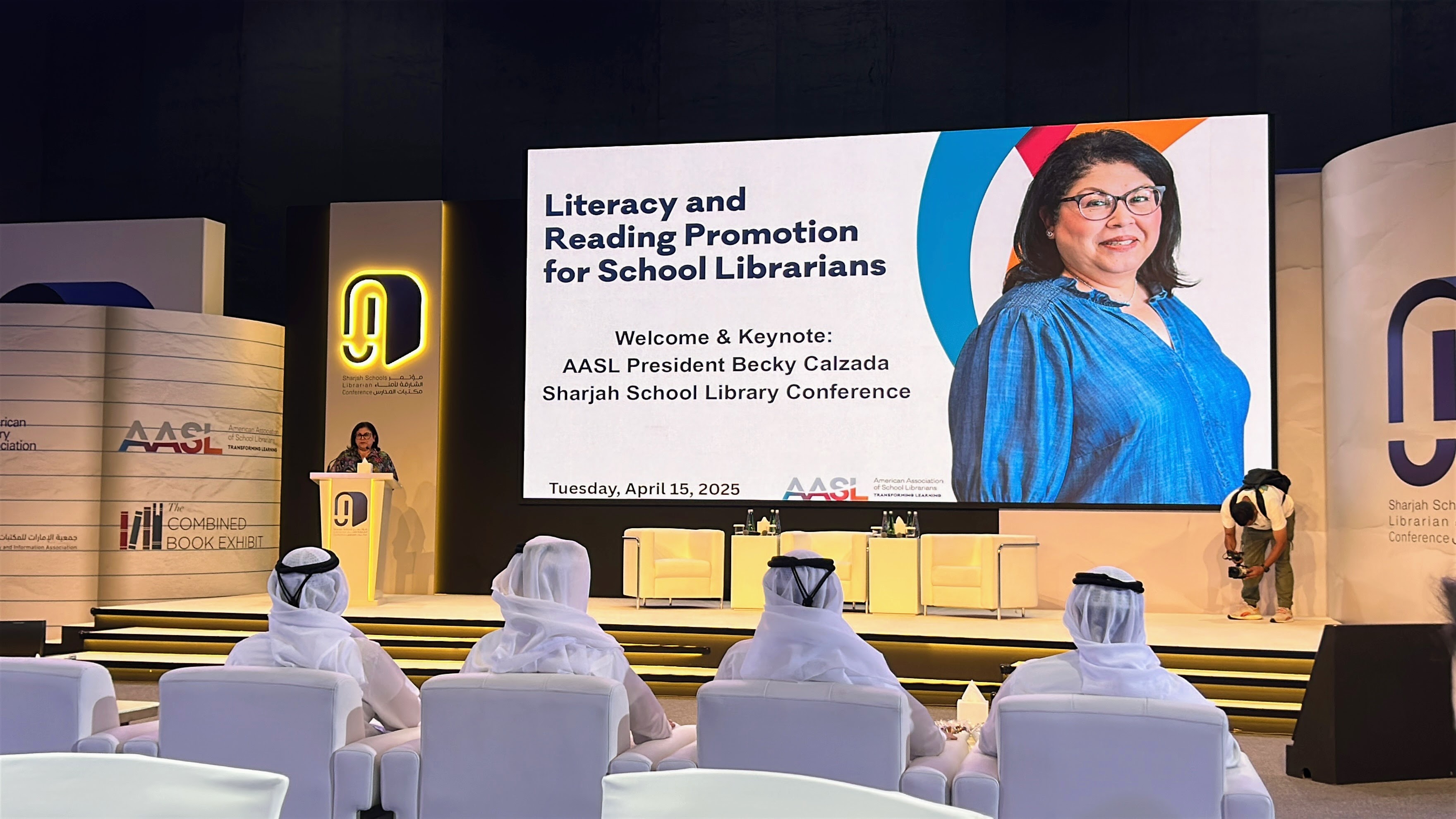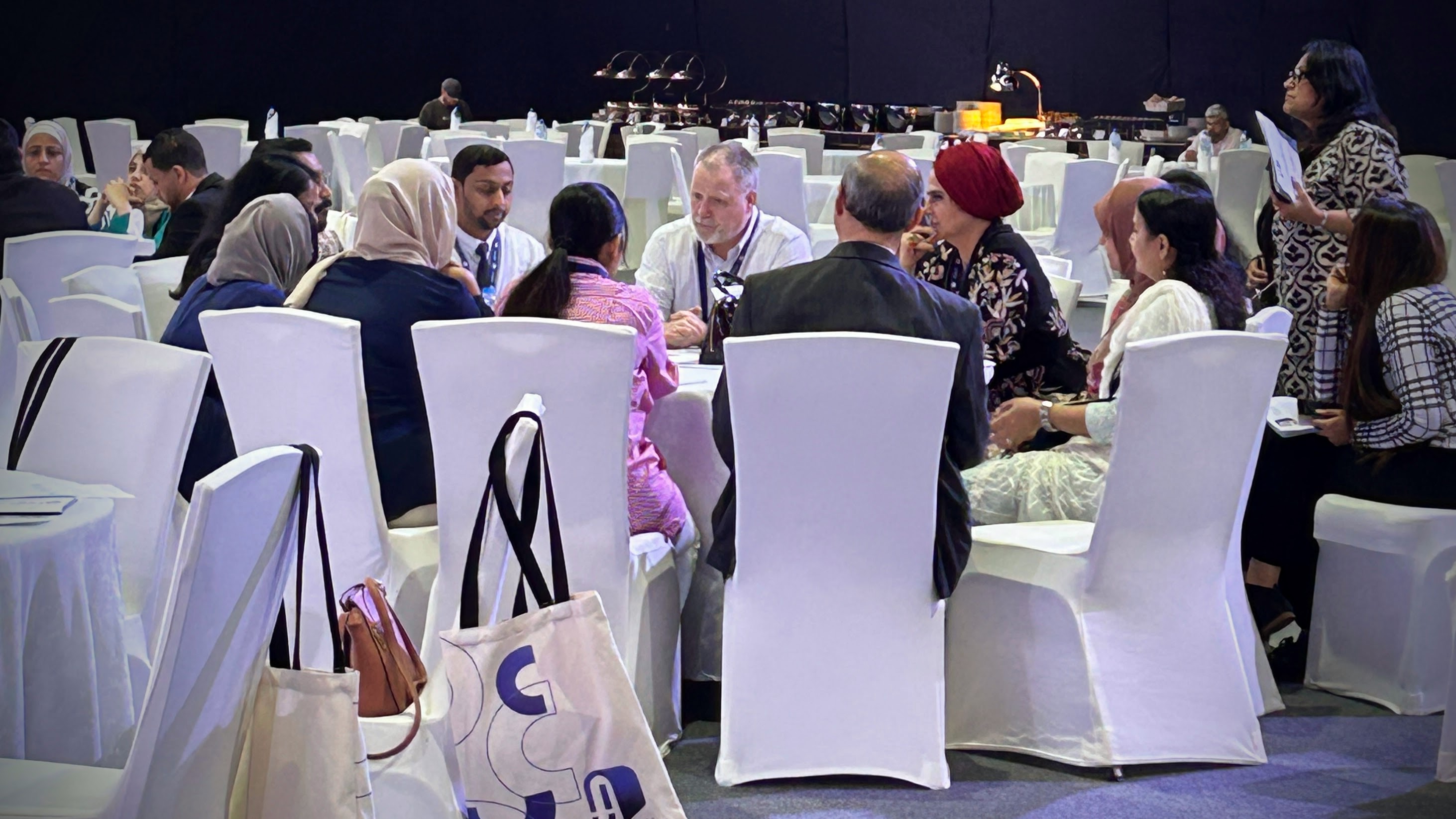Lessons from an International School Librarian Conference in the United Arab Emirates
School librarians from the United States attended the Sharjah School Librarian Conference in the United Arab Emirates. SLJ spoke with AASL president Becky Calzada and 2016 School Librarian of the Year Todd Burleson about the event.
In April, school librarians from the United States attended the Sharjah School Librarian Conference in the United Arab Emirates. The American Library Association (ALA) and the American Association of School Librarians (AASL) partnered with the Sharjah Book Authority and the Emirate Library and Information Association for the two-day conference, which focused on literacy and reading promotion.
To learn about the trip and conference, SLJ caught up with American Association of School Librarians president Becky Calzada, who provided the keynote address to open the conference and presented a session entitled “Coming Together through Associations to Empower School Librarians,” and 2016 School Librarian of the Year Todd Burleson, who presented on connecting reading and new technologies.
 |
Becky Calzada presents at Sharjah School Librarian Conference. |
What was your biggest lesson from the conference?
Becky Calzada: My biggest takeaway was more an observation from start to end. It was so humbling to hear and see the genuine appreciation expressed by the school librarians in attendance after learning from the incredible AASL members who presented on topics such as assessment, technology integration, literacy practices, collaboration, and reading promotion. In between sessions, they’d come ask questions of us, or want to introduce themselves. Some exchanged a business card and
others wanted to connect on LinkedIn. They truly wanted to stay in touch and continue learning.
Being a connected librarian has always offered a community for sharing ideas, resources, and engaging in discussions about teaching practices, trends, and challenges. At an international conference, this possibility is amplified on a global level, which left me excited to see what’s to come.
Todd Burleson: For me, the biggest lesson came from shifting perspective. As someone who loves photography, I tend to think in terms of light, lenses, shadow, and texture. This trip gave me new lenses to see the world of libraries and literacy. It reminded me that every community brings its own light to learning, shaped by culture, language, and history. When we take the time to look through those lenses, we do more than learn. We grow. We become better listeners, better educators, and more compassionate human beings.
What practical takeaway from the conference will be directly implemented into how you do your job?
BC: So many things! I learned so much from my AASL colleagues who shared their expertise, but the practical takeaway was rooted more in my observance of the partnership of several organizations. ALA, AASL, the Sharjah Book Authority (SBA), and the Emirate Library and Information Association (ELIA) worked together on this two-day conference for school librarians. Our shared mission to elevate and encourage today’s youth to become sustained readers is a driving force because we all recognize the life-changing impact on nurturing strong, lifelong reading habits in learners. This opportunity to learn with and from one another was a powerful experience that I will never forget.
TB: One of the most practical takeaways was seeing how emerging technologies like AI and augmented reality are being used in thoughtful, student-centered ways. These tools are not replacing books. They are expanding what is possible, creating new ways to tell stories and meet kids where they are. I am excited to integrate more of this into my own work, especially with students who might not initially see themselves as readers. Technology can be a powerful invitation into story.
Why is it important to attend an international conference like this?
BC: Any conference a person attends is an opportunity to learn and connect with like-minded individuals. This conference is no different in that basic way.
Attending an international conference allows you to see your profession through the lens of other cultures and experiences for both students and school librarians. You learn about unique programs and ways school librarians in the UAE work with reluctant readers. You also benefit by expanding your professional learning network on a global scale, opening you up to future learning from colleagues on the other side of the world.
 |
Todd Burleson (center) speaks with other attendees. |
TB: Attending an international conference reminds you that your way of doing things is not the only way. It creates space for listening, for humility, and for connection. You meet librarians and educators whose challenges feel familiar, but whose approaches are shaped by different traditions and needs. That kind of cross-cultural exchange is vital. It helps us reimagine what libraries can be, not just for our own communities, but for the world.
What was the most surprising or revealing thing you saw/learned while there?
BC: The most revealing and affirming thing to me was the reminder that no matter where you are in the world, school librarians share the same challenges and celebrations. We all want learners to love reading, we all want to collaborate with teachers and want to have a strong partner with principals building a strong reading culture in our schools. I also noticed how eager and excited these 100-plus attendees were to hear new ideas and our insights on solving challenges they are experiencing.
TB: What surprised me most was the sheer number of English-language books I saw. These were not just a few shelves. They were entire collections filled with the same titles my students are reading. It stopped me in my tracks. These readers are not just passionate. In many cases, they are reading these books in a language that is not their first. That level of fluency and love for literature is deeply humbling. It made me reflect on my own language learning and how important it is to celebrate and support multilingualism in our students and in ourselves.
RELATED
The job outlook in 2030: Librarians will be in demand
The job outlook in 2030: Librarians will be in demand
ALREADY A SUBSCRIBER? LOG IN
We are currently offering this content for free. Sign up now to activate your personal profile, where you can save articles for future viewing






Add Comment :-
Be the first reader to comment.
Comment Policy:
Comment should not be empty !!!